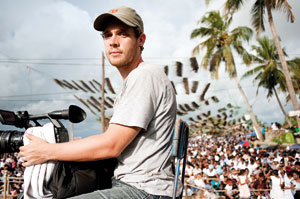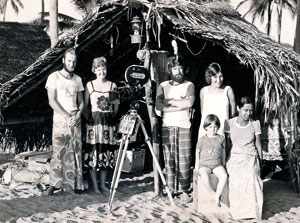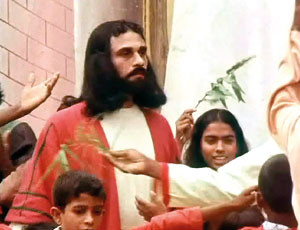In 1976, a young anthropologist named Sharon Bell travelled to Sri Lanka to begin work on her thesis. She learnt Sinhala in three months and settled down in the village of Kanewala for two years. She became friends with local families there and in Pelpitigoda and Duwa as well, following the fishermen from the latter village to Mullaitivu on their annual migration.
Out of her stay came three films made in collaboration with her partner Geoff Burton: ‘Dancers Were Only Allowed to Dance’, ‘Fishermen of Duwa’ and ‘Four Women’. In the footage, Sharon interviews dancers and drummers shackled to their art by their caste, to the faithful as they stage their annual Passion play and to four very different women from a single village. Though the landscape is breathtakingly lush and beautiful, the issues are less so – the rampant caste discrimination, exploitation and grinding poverty are openly addressed.
 |
| Aaron shooting the Passion play at Duwa and below right a still from the film |
 |
| Back in the ’70s: Sharon and Geoff (right) with their sound recordist Leo Sullivan and wife (left) and others on the beach of Mullaitivu |
 |
Now, over three decades later, her son Aaron Burton is following in his parents’ footsteps. He is in the process of making a trio of small documentaries that revisit Pelpitigoda, Duwa and Kanewala. However, even as he goes looking for the old friends in the films or the family they have left behind, he hopes the end product will be as revealing of what he has himself inherited from both his parents.
Though he has visited with his parents several times, Aaron says he first became interested in working in Sri Lanka when, still in high school, he served as an Assistant Editor on his first film ‘The Actor and The President’. Written and narrated by Sharon and directed by Geoff; the movie was about their close friend Vijaya Kumaratunga. Years later, that interest would be rekindled when Australian media began to carry heated debates on what was to be done about the ‘boat people’ fleeing Sri Lanka.
A chance to make a behind the scenes documentary about a new film ‘Siddhartha: The Buddha’ being made in Sri Lanka gave him another reason to come. (His father will serve as a cinematographer for the project.)
A student of documentary film making, Aaron says he was increasingly drawn to inter-cultural themes. “In my work I just became more interested in stories that could bridge moral communities,” he says. Though he has arrived in Sri Lanka at the same age as his mother – 27 – and his work too will go toward a PhD thesis, Aaron will be all things on this project – researcher, narrator, location sound engineer and cinematographer. It doesn’t help that he knows he has big shoes to fill.
“I want to capture it all as well as my father did, and every time, I fail,” he admits ruefully. The films made by Sharon and Geoff have aged gracefully – her quietly delivered narration, and the long, lingering sequences mimic the time and pace of village life. Aaron admits that he had little patience with them when he was younger – “the anthropological film has a pace that just puts you to sleep,” he grins.
However, it’s worth noting, that for their time, the films were both artistically and academically well out of the ordinary. As a gifted cinematographer, Geoff brought his own distinctive aesthetics to filming dramatic sequences of plays and dance performances, even as he captured lovely landscape and the smiling faces of their subjects. But it was Sharon’s approach that really caused a stir.
In a Professorial Lecture delivered at Griffith’s University in 2004 titled ‘The Secret Lives of Us’ Sharon looks back on that time. The lecture is available in full online, and in it she remembers herself as a young feminist struggling to justify incorporating personal narratives shared in the words of her subjects into her academic work. As this was in stark contrast to the more widely accepted emphasis on data and ‘theoretically abstract arguments’, her ideas did not meet with favour among some of her senior male colleagues.
Complicating matters as well is that in the three films, Sharon is very much a participant. She identifies the four women of Kanewala as her friends and is sometimes seen in the frame as she converses with her subjects (speaking Sinhala ‘albeit as a five-year-old [would] as one old woman friend graciously informed me after a year in the field.’) “Actually, though they may seem dated now, the film and the approach behind them were quite left of field...even though both my parents were working for the Anthropology Department they were both pushing more creative directions,” says Aaron. (The films were funded by the University of Sydney and the Australian Film Commission.) He’s also quite unapologetic about his own desire for introspection.
Acknowledging the many parallels, he says it is a matter of a theme as well – “we’re both looking at what you inherit. My work is about the next generation – so I look at what I inherit from my mother and father and what the people in the film inherit from their parents.” He says his own thesis will look at ‘provenance in film making’. Unlike film makers of his parents’ era who necessarily worked in teams, modern technology allows Aaron to produce an HD film entirely by himself, and he sees this as a chance to make a deeply personal work. His is far from the only life touched by technology.
Speaking of how a young girl originally filmed making and selling string hoppers in rural isolation now owns an internet cafe at a busy junction, Aaron sees that the landscape of the villages has been profoundly altered. With their supermarkets and long distance commuters, they’ve begun to resemble suburbs. There have been some “incredible changes” he says, explaining that one of the major themes of the new trilogy will be exploring the changing notion of villages in Sri Lanka and the ‘death of the village’. “It’s really interesting to see what changes in the culture, what remains and what gets completely abandoned,” he elaborates.
In the village of Duwa, Aaron had a chance to film the five hour spectacle afforded by the elaborate annual Passion Play staged by that Catholic community. A life-sized puppet of Jesus, around 200 years old, continues to take centre stage, but he was interested to find that the much coveted parts in the play were now left to the younger generation where they used to be inherited.
“It was really reflective of the changing dynamics of the village,” says Aaron, revealing the group had even set up a Faecbook page (You’ll find it under ‘Duwa Passion Play.’) His guides through this trip have been found among the people his parents first met nearly 33 years ago and who they’ve stayed in touch with since. Travelling around by bus around the island, Aaron has been forging his own relationships with the next generation. Still he attributes the ease of his acceptance to the fact that these people know and trust his parents. It’s why one of his working titles is a particularly apt one - ‘Ammagae Gama’ or ‘My Mother’s Village’.
|




